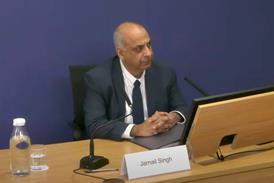The Gazette reports that the Solicitors Regulation Authority is to carry out a ‘rapid review’ of voluntary accreditation schemes, in consultation with the Legal Services Commission and Office of the Immigration Services Commissioner, to find out which have a regulatory function and which should be mandatory (see [2009] Gazette, 5 March, 2). Presumably, any that do have a regulatory function will become mandatory.
It is fair enough that the SRA should consult the OISC, as the commissioner is a fellow regulator – and their regulatory requirements may complement each other. However, it does not look at all good for the SRA to be consulting the LSC, which is simply a purchaser of legal services and has no regulatory role.
Furthermore, it seems inherently wrong for the regulator, which has a duty under the Legal Services Act to encourage the independence of the profession, to be consulting the LSC, which is sponsored by the Ministry of Justice, on what qualifications solicitors will have to acquire to take cases against the same MoJ and other government bodies that fail to comply with the law.
The LSC uses some accreditation schemes as a form of quality assurance, generally by requiring that supervisors (but not caseworkers) are members of relevant panels. It believes that much of the work that it funds can be undertaken by paralegals under professional supervision. If the LSC and SRA decide that this work can only be done by panel members, this will be a profound change of approach on the LSC’s part, and will have far-reaching consequences. Many of those currently doing the work would be barred from doing so, as they would be ineligible to apply for panel membership. Their places would have to be taken by solicitors or legal executives, who, even in these difficult times, may not be willing to work for the rates that the LSC deems sufficient.
Furthermore, if the LSC supports the work it funds being reserved to panel members, it will also need to require the Bar Standards Board to impose similar accreditation schemes for barristers, so as to avoid the perception of bias.
On the plus side, reserving major areas of work such as criminal defence, immigration and family law to panel members will create great opportunities for those who are eligible, particularly existing members of schemes, as they will have exclusive rights to certain types of work, regardless of the wealth or importance of the client. It may be that those who are able to pay for the legal advice that they need will not be pleased at the limitations placed on their freedom to instruct the solicitor of their choice, and will be even less pleased at the difficulty of finding a panel member with the capacity to take on their case, but that is irrelevant if accreditation serves a regulatory purpose.
I wonder how many solicitors who specialise in representing powerful people in trouble with the law will relish the current rigorous process of police station accreditation, or, indeed, how many of them would qualify?
Perhaps the SRA and the LSC should remember the old warning: ‘be careful what you wish for’.
Lucy Scott-Moncrieff, Scott-Moncrieff Harbour & Sinclair

























No comments yet